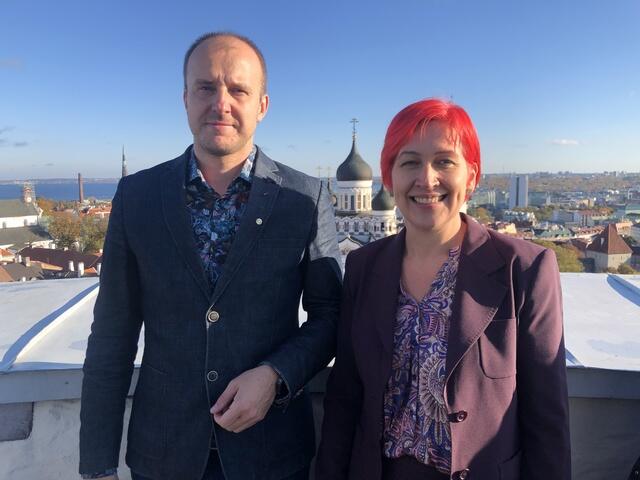What makes places resilient?
What are the key factors for regions to offer a prosperous and socially intact life? To find answers to the questions and have a closer look at projects that focus on that aim, about 20 members of the Innovation Circle Network from seven different countries met for the annual conference. A place where one can see how social entrepreneurship and private engagement contribute to the growth of the region is Türi. The so-called Spring Capital of Estonia due to its major public events in spring and lovely gardens is home to ICN board chairwoman Triin Pärna. Also, Türi's mayor Sulu Särkinen is a member of the IC Network. Together they were hosting the annual conference that addressed resilience strategies and especially focused on social entrepreneurship.
With his presentation "Türi - today we create tomorrow - the green way of thinking, sustainability, business development" 26-year-old Vice Mayor Elar Niglas introduced Türi's plan to enrich public spaces through rearrangement and with the help of private entrepreneurs. For example, the idea is to turn a parking place into a space where people gather, with a cafeteria and places to sit and meet. The plan still includes parking places but these won't be in the focus any longer.
"Work with nature, not against it", is Inga Kärk's theme. The environmental specialist from Türi explained to the participants how she is preparing community gardens together with students from Türi's public school. Her approach is holistic focussing on educating children. Within an EU-funded project, she wants to build a greenhouse in Türi that can be used as a classroom.
Reeda Lisman enriched the conference with some very interesting insights into the region's biggest projects and one that "hopefully attracts a lot of tourists", says Lisman. The idea of the "inspiration gardens park" is to arrange 100 or more sample gardens in collaboration with landscaping and horticulture companies, so people can get real inspiration to design their dream garden. The municipality of Türi supports the founder and aims to offer inspiration, consultation, and knowledge as well as internships, green therapy, and a platform for networking.
For the first time, new ICN partner Arvika Business Center from Sweden attended the annual conference. “Our most important task is to get people into work or further studies", explained Birger Pettersson Wiik, chief executive officer at Arvika Business Center. Furthermore, the new ICN partner aims to be "an attractive meeting place that stimulates education, development, networking and innovation." Arvika is located two hours away from Norway's capital Oslo and home to about 25.000 people.
Arvika Business Center also is part of "We Who Own the Border", a collaborative project aimed at strengthening the cross-border cooperation between Sweden and Norway. "By establishing a platform for dialogue, we bring together public sector representatives, businesses, and the society to address common challenges and harness the opportunities in the border region", pointed Birger Pettersson Wiik out. The goal is to foster economic and social integration and enter a long-term, sustainable partnership that benefits both countries.
Roger Santokhie from KBT Vocational College in Trondheim (Norway) presented information about the POMEIL project, recently granted to the consortium where ICN and partners from Norway, Estonia, Poland, and Greece are included. POMEIL stands for Promotion of Migrant Entrepreneurship and Integration in the European Labor Market and is co-funded by the Eramus+ Programme of the European Union. The motivation for this program is to identify challenges faced by immigrants and refugees in their equitable access to the labor market of their host countries and thus their overall socio-economic integration.
Target groups are Immigrants and refugees, with a special focus on Ukrainian refugees. Adult students with immigrant backgrounds as well as adult educators and staff, organizations and associations in the fields of adult education, vocational and technical education, immigrant support and integration, and refugees are another target group. What the organizers want the participants to achieve is gaining social and cultural capital. "Both are not measurable as financial capital is. But they are key. Language is power", emphasized ICN member Roger Santokhie.
Besides interesting debates and cultural activities, the ICN members also visited the Türi's community house where the benefits of cooperation between generations, passing on skills and sustainable thinking as well as voluntary work can be seen. Furthermore, the participants visited Pipi-Liis Siemann, a member of the Reform Party and the Estonian parliament in Tallinn who gave a tour of the Riigikogu.
"Cooperation between the private sector and local municipalities is a part of the motivation of this network, which we implemented to create different things, bring together people, exchange ideas and knowledge, and make this world a better place", stated ICN general secretary Alf Johansen during a meeting. Former ICN chairwoman Rita Merca added: “We want to make our communities better places to live. And when we meet things are happening.”
And this is exactly what happened during this annual conference. Things are happening and ICN continues to help people to believe in themselves and grow and create.
Christin Schmidt
________________________
Media Manager & Freelance Journalist
mobile +49 177 3012441
E-mail: schmidt.christin@gmail.com

